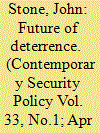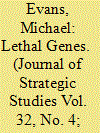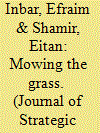| Srl | Item |
| 1 |
ID:
112450


|
|
|
|
|
| Publication |
2012.
|
| Summary/Abstract |
How valuable might deterrence be for managing current and near-future threats to international peace and security? How might it work in such contexts? In 2010 a symposium was held at King's College London in order to address these questions. The participants examined a wide range of issues. A prominent concern was the extent to which the Cold War theory and practice of deterrence remains a valuable stock of relevant experience today. Specific attention was also given to the utility of conventional force as a deterrent, to the prospects for cyber deterrence, and to the feasibility of deterring non-state actors such as terrorist organizations. The participants all considered that deterrence has some role to play in Western strategy and sought to clarify what this might amount to under the specific conditions they examined.
|
|
|
|
|
|
|
|
|
|
|
|
|
|
|
|
| 2 |
ID:
089955


|
|
|
|
|
| Publication |
2009.
|
| Summary/Abstract |
This article examines the way in which urban areas have emerged to become one of the most common environment for armed conflict in the early twenty-first century, The essay argues that, while military professionals have sought to improve their understanding of urban military operation in an ara of global demographic movement from landscape to cityscape, strategic theory lags behind operational practice. Western strategy currently lacks an effective urban lens with policy-relevant analysis neglected within the strategic studies community. The article seeks to identify how an urban strategic focus can be developed in the new millennium. To this end, and in order to provide a context for detailed contemporary analysis, the essay examines the historical nexus between war, strategy and the city; assesses continuity and change in the characteristcs of modern urban military operations;and surveys the professional military debate on the meaning of urban operations.
|
|
|
|
|
|
|
|
|
|
|
|
|
|
|
|
| 3 |
ID:
128303


|
|
|
|
|
| Publication |
2014.
|
| Summary/Abstract |
'Mowing the Grass', Israel's strategy in the twenty-first century against hostile non-state groups, reflects the assumption that Israel finds itself in a protracted intractable conflict. The use of force in such a conflict is not intended to attain impossible political goals, but a strategy of attrition designed primarily to debilitate the enemy capabilities. Only after showing much restraint in its military responses does Israel act forcefully to destroy the capabilities of its foes, hoping that occasional large-scale operations also have a temporary deterrent effect in order to create periods of quiet along its borders. The Israeli approach is substantively different from the current Western strategic thinking on dealing with non-state military challenges.
|
|
|
|
|
|
|
|
|
|
|
|
|
|
|
|
| 4 |
ID:
139324


|
|
|
|
|
| Summary/Abstract |
A common assumption in the West is that distance and space are no longer key considerations in strategy and politics. ‘Over there’, the argument goes, can quickly and dangerously become ‘over here’. Yet, as Patrick Porter contends, this is a dangerous fallacy that distorts Western strategy. A proper consideration of the role of distance should not lead to disengagement or isolation, but rather to a more selective and considered – and thus more flexible – foreign and security policy.
|
|
|
|
|
|
|
|
|
|
|
|
|
|
|
|